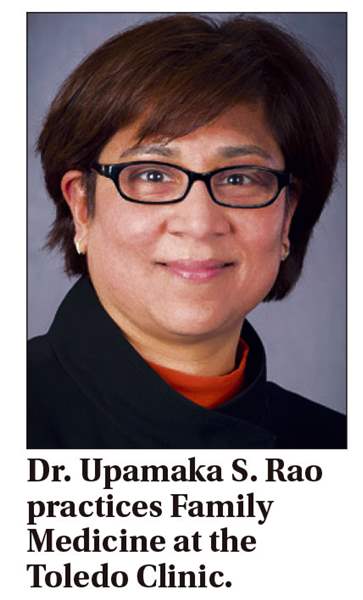
GUEST COMMENTARY
Relationship with doctor crucial to patient’s health, well-being
2/3/2014

This is one of a series of columns about health issues written by staff members of ProMedica, Mercy, Toledo Clinic, and the University of Toledo Medical Center, the former Medical College of Ohio.
There is no greater wealth than good health. Healthy individuals make healthy families and healthy communities.
The World Health Organization defines health as not merely the absence of disease but as physical, mental, and social well-being. Your family physician is your coach in guiding you and your family towards that goal.
Family physicians are doctors that specialize in you. Our unique relationship with you and your family make us doctors of wellness and illness. On any given day we might be taking care of a 6-month-old with a bad ear infection, an adolescent with a sports-related injury, a 40-year-old mother who has just been diagnosed with breast cancer, or a daughter who is concerned about her elderly parent’s memory.
Additionally, even if patients do not have a pressing health concern, as family physicians, our priority is establishing a long-term relationship with you and your family to focus on prevention of illness, education, and building a partnership with you. Therefore, this doctor-patient relationship is not only important during an illness but rather it is essential to maintaining physical, mental, and social well-being.
The landscape of medicine is changing rapidly and our knowledge base is expanding at an exponential rate. The application and practice of medicine is becoming increasingly more challenging. Today, as people are living longer physicians find they treat patients with complex medical problems and often must manage those problems as well as other issues that affect us as we age. Thanks to exciting new areas of medicine such as personalized medicine, we will start to move away from the “one-size-fits-all” model to one that instead focuses on the individual patient in front of us.
When you come in for your wellness exam our goal is to determine those illnesses that are most likely to affect you. We do this by looking at epidemiologic data provided by the Centers for Disease Control and Prevention, which show that heart disease and lung cancer are the top two leading causes of mortality in men and women in the United States in general and, more specifically, in Lucas County.
We then carefully consider your family history because genetics plays a role in what illnesses tend to run in your family and might eventually affect you. Most importantly the majority of diseases are related to how you live your daily life and what you eat. There is definitely some truth to the saying "You are what you eat." From this initial evaluation we can then determine the important screening tests and follow evidence-based guidelines to create a road map that is best suited to you.
After we develop the patient's risk stratification we then decide on a best course of action. We can consider screening tests for early detection and prevention of heart disease, cancer, weight management, and a smoking cessation plan. Stress management and screening for depression also play an integral part of a successful wellness plan. Studies have shown that regular exercise, keeping cholesterol and blood sugar in the normal range, and, for certain patients, an aspirin a day can prevent heart disease according to the American Heart Association. Diets low in saturated fats, red meats, and quitting smoking can prevent breast, lung, and colon cancers. Smoking has been associated with about 50 percent. of cancers world wide and is the leading cause of mortality and morbidity according to WHO.
Here are some simple tips to get you started. Eat regularly and at the same time everyday, drink a glass of water before each meal, eat a variety of colored vegetables, and stay away from processed foods, red meats, and saturated fats. Whenever possible eat at home and enjoy your meal by eating slowly. Incorporate simple exercise into your day: walking, biking, swimmimg, or trying yoga with a friend five days a week for at least a half hour. Choose healthy foods that you like and try activities that are fun for you.
As family physicians we pride ourselves in caring for you, your family, and the entire community. Our goal is to work with you as your health-care advocate to keep you healthy and happy. We are here to help you navigate the complex and changing health care system while providing you with the best care possible. The reason I practice family medicine is because of the personal fulfillment I gain from building long-standing relationships with my patients and for the immense privilege of being a part of their lives. Family doctors are advocates for you and your family, and we truly believe there is no greater wealth than your health.
Dr. Rao practices Family Medicine at the Toledo Clinic. For more information, visit toledoclinic.com.